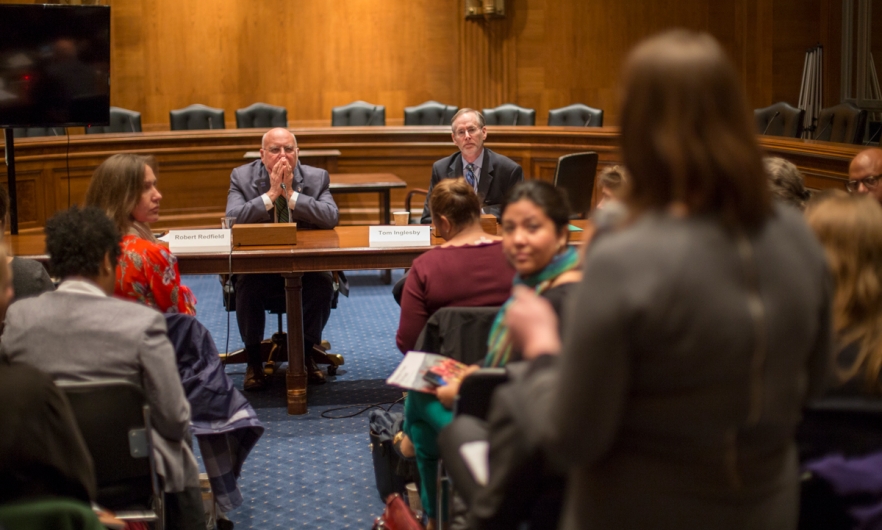CDC director discusses latest on DRC Ebola outbreak at Center for Health Security event on Capitol Hill
Center News

November 06, 2018 – In extensive comments about the ongoing outbreak of Ebola in the Democratic Republic of Congo (DRC), Robert Redfield, MD, director of the Centers for Disease Control and Prevention, emphasized that security concerns in the region are the preeminent factor hindering US response.
Redfield shared the update on Nov. 5 at an event on Capitol Hill organized by the Johns Hopkins Center for Health Security for congressional staffers and other public health stakeholders. He addressed security and other serious challenges, the possible trajectory of the outbreak, how CDC and the US government are involved in the response, and what is needed to control spread of the disease. Tom Inglesby, MD, director of the Center, led a discussion with audience members following the CDC director’s remarks.
Since early August when this outbreak of Ebola virus disease was declared, the DRC’s Ministry of Health has identified 300 suspected or confirmed cases. More than 150 people have died. The outbreak is on track to become the DRC’s largest in recorded history.
“I don’t think we can underestimate the importance of operationalizing infection control,” said Redfield. “With the intensification [of Ebola’s spread], we need to make sure we don’t learn on the run as it gets into South Sudan, or learn on the run as it gets into Uganda.”
He expressed optimism about the regional ability to detect and contain any Ebola cases that cross international borders. He lauded the DRC for its major contributions to the response effort and acknowledged that the country cannot manage this outbreak on its own.
That’s why more than 80 CDC personnel are helping with the response, spread among the DRC Ministry of Health and the ministries of health in neighboring countries to work on preparedness and surveillance efforts. CDC also has personnel coordinating with the World Health Organization in Geneva.
But security remains a significant hurdle. CDC cannot safely access the areas where virus transmission is occurring.
“This is one of the challenges: whether we’re able to contain, control, and end the current outbreak with the current security situation, or do we move into the idea that this becomes more of an endemic Ebola outbreak in this region,” said Redfield. “We’ve never really confronted an endemic Ebola outbreak. We’ve contained them.”
Redfield added that the best way to prepare and protect the United States related to this outbreak is to contain it, which would require an evolving containment strategy if Ebola crosses multiple borders in and around the DRC.
A summary of the entire discussion during the hour-long event is available here.
About the Johns Hopkins Center for Health Security:
The Johns Hopkins Center for Health Security works to protect people from epidemics and disasters and build resilient communities through innovative scholarship, engagement, and research that strengthens the organizations, systems, policies, and programs essential to preventing and responding to public health crises. The Center is part of the Johns Hopkins Bloomberg School of Public Health and is located in Baltimore, MD.
